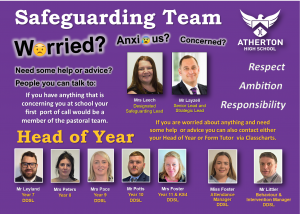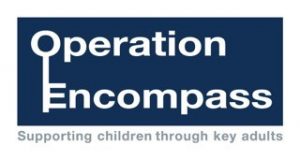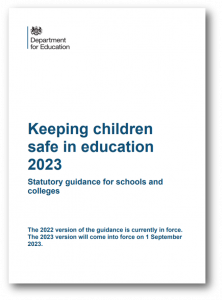Safeguarding
At Atherton High School, we are committed to safeguarding and promoting the welfare of our young people. We believe that all students, regardless of age, gender, disability, racial or cultural heritage, religious belief or sexual orientation, have the right to be protected from all types of harm and abuse.
 Safeguarding is everyone’s responsibility and all adults have a full and active part in protecting our students from harm. Our safeguarding processes and procedures, promote a culture of safeguarding within our school.
Safeguarding is everyone’s responsibility and all adults have a full and active part in protecting our students from harm. Our safeguarding processes and procedures, promote a culture of safeguarding within our school.
All aspects of the school culture ensures that children feel able to learn and develop in a safe, calm and orderly environment. In order to fulfil this responsibility effectively, all practitioners should make sure their approach is child-centred. This means that they should consider, at all times, what is in the best interests of the child and be aware that children includes everyone under the age of 18.
Safeguarding and promoting the welfare of children is defined as:
- protecting children from maltreatment;
- preventing impairment of children’s mental and physical health or development;
- ensuring that children grow up in circumstances consistent with the provision of safe and effective care; and taking action to enable all children to have the best outcomes.
Child Protection is a key aspect of safeguarding which is concerned with protecting children from abuse and maltreatment, and involves working with social care and/or the police when a child is deemed to be at risk of significant harm. There are 4 categories of abuse (click on each for definition):
Some of the signs of abuse and/or problematic mental health include the following indicators. However, it should be remembered that there may be a perfectly innocent explanation for any of these and it is important not to jump to conclusions. To this end our Pastoral and Safeguarding Teams will take any concerns seriously but ensure any enquiries are made in a sensitive manner:
- Changes in appearance including personal hygiene and weight loss.
- Bruises and injuries, and evidence of pain or discomfort.
- Clingy and/or fearful behaviour.
- Changes in eating habits.
- Uncharacteristic and/or secretive behaviour.
- Problems with peer groups.
- Changes in sleep patterns.
- Self-harming behaviour.
- Talk about suicide and/or death.
- Changes in mood including prolonged anxiety, stress, fearfulness, being easily prone to tearfulness and/or tendency to overreact.
- Loss of interest in social events and/or hobbies.
- Deterioration of attention span and/or restlessness.
- Evidence of age-inappropriate sexual knowledge.
Many of the above may also be signs of problematic mental health. Atherton High School is committed to being alert to signs of abuse and/or problematic mental health and intervening early to safeguard children’s safety, welfare and wellbeing.
All staff and volunteers undertake a full enhanced Disclosure and Barring Service Check. All staff receive annual Child Protection and Safeguarding update training, and are aware of the procedures for passing on concerns within the school.
Our Safeguarding Team
| Designated Safeguarding Lead (DSL) | Mrs Leech – Welfare Manager | 01942 885500 | amanda.leech@athertonhigh.com |
| Senior Lead and Strategic Lead | Mr Layzell | 01942 885500 | |
| Link Governor | Mrs F Quinlivan | ||
| Children’s First Partnership Hub (CFPH) | 01942 828300 | ||
| Local Area Designated Officer (LADO) | Andrew Chisnall | 01942 486042 |
We also work closely with the Local Authority and other appropriate external agencies, to ensure the welfare of all our students. Please see the contact details below:
| Child and Adolescent Mental Health Single Point of Access | 01942 482411 |
| Safeguarding Hub | 01942 486262 |
| NSPCC | 0808 800 5000 / www.nspcc.org.uk |
| CEOP (Child Exploitation and Online Protection Command) | 0800 1111 / www.ceop.police.uk |
| Childline | 0800 1111 |
Prevent
The Government Prevent strategy started in July 2015, were all schools (as well as other organisations), have a duty to safeguard children from radicalisation and extremism. This means all schools have responsibility to protect children from extremist and violent views, in the same way we protect children from drugs or gang violence. Importantly, schools can provide a safe place for pupils to discuss these issues, so that they better understand how to protect themselves.
Radicalisation refers to the process by which a person comes to support terrorism and forms of extremism. There is no single way of identifying an individual who is likely to be susceptible to an extremist ideology. From July 2015 all schools are subject to a duty under section 26 of the Counter-Terrorism and Security Act of 2015, to have ‘due regard to the need to prevent people from being drawn into terrorism’, known as the ‘Prevent Duty.’
Atherton High School is committed to providing a secure environment for pupils and staff, where all children feel safe. All adults working in our school, regardless of their role, recognise that safeguarding is everyone’s responsibility, whether they have direct or indirect contact with young people.
Key Terms
The following definitions create clarity when discussing radicalisation and extremism:
Ideology – a set of beliefs.
Radicalisation – the process by which a person comes to support terrorism and forms of extremism leading to terrorism.
Extremism – a vocal or active opposition to fundamental British values; including democracy, the rule of law, individual liberty and mutual respect and tolerance of different faiths and beliefs.
Terrorism – an action that endangers or causes serious violence, damage or disruption and is intended to influence the Government or to intimidate the public and is made with the intention of advancing a political, religious or ideological cause.
When applying this guidance we use the following accepted Government definition of extremism which is:
‘Vocal or active opposition to fundamental British values, including democracy, the rule of law, individual liberty and mutual respect and tolerance of different faiths and beliefs; and/or calls for the death of members of our armed forces, whether in this country or overseas.’
The full Government Prevent Strategy can be viewed at
https://www.gov.uk/government/uploads/system/uploads/attachment_data/file/97976/prevent-strategy-review.pdf
Operation Encompass
 Atherton High School has signed up to Operation Encompass. This is a Police and Education early information sharing partnership which enables schools to offer immediate support for children and young people witnessing domestic abuse. Information is shared by the police with the school’s safeguarding team prior to the start of the school day following an incident of domestic abuse in the previous 24 hours or over the weekend which has been attended by police officers. This information enables appropriate support to be given, dependent upon the needs and wishes of the child. Children experiencing domestic abuse are negatively impacted by this exposure; domestic abuse has been identified as an Adverse Childhood Experience and can lead to emotional, physical and psychological harm. Operation Encompass aims to mitigate this harm by enabling schools to maintain a watchful brief, intervene with support if needed, and help to make the day a better one for children. Right click on the logo for more information.
Atherton High School has signed up to Operation Encompass. This is a Police and Education early information sharing partnership which enables schools to offer immediate support for children and young people witnessing domestic abuse. Information is shared by the police with the school’s safeguarding team prior to the start of the school day following an incident of domestic abuse in the previous 24 hours or over the weekend which has been attended by police officers. This information enables appropriate support to be given, dependent upon the needs and wishes of the child. Children experiencing domestic abuse are negatively impacted by this exposure; domestic abuse has been identified as an Adverse Childhood Experience and can lead to emotional, physical and psychological harm. Operation Encompass aims to mitigate this harm by enabling schools to maintain a watchful brief, intervene with support if needed, and help to make the day a better one for children. Right click on the logo for more information.





